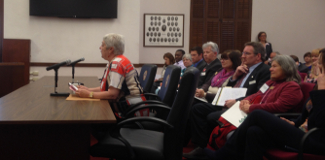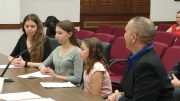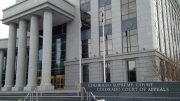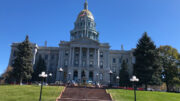By Jeffrey A. Roberts
CFOIC Executive Director
The Senate Education Committee on Wednesday approved a weaker version of the school board transparency bill that died earlier in the legislative session.
Like the measure that failed last month, SB 14-182 is aimed at giving the public more information about school board discussions that take place behind closed doors. But the new bill only adds the requirement that executive session minutes reflect the amount of time spent discussing each topic, in addition to a broad description of each topic as required under current law.
A requirement that all portions of school board executive sessions be electronically recorded, the most controversial element of the unsuccessful legislation, is not part of the revived proposal. That idea ran into strong opposition from legislators who argued that keeping the recorder going would chill important attorney-client discussions, even though a judge’s OK would have been necessary to release any recordings to the public.
Democratic Sen. Mary Hodge of Brighton and Democratic Rep. Cherylin Peniston of Westminster sponsored both bills because of a perception that some school boards in Colorado have held secret meetings in violation of the state’s Sunshine Law. Hodge said Wednesday that logging the time spent discussing each executive session topic would at least “give a feel for the importance, the intensity” of a particular closed-door discussion.
The information would have to be posted on a board’s web site, or published some other way, no more than 10 days after the minutes are approved. If any electronic recordings are made, the measure also would require that they be kept for at least 24 months.
As they did in committee hearings on the previous bill, parents of children in Douglas County and Jefferson County schools complained to lawmakers that their boards of education seem to spend an inordinate amount of time meeting in secret.
Jeffco parent Wendy McCord urged passage of the bill. “Should it come to light that there have been inappropriate discussions during one or more executive sessions, there will at least be some basis of information that a citizen can use to start asking more questions,” she said.
But Jane Urschel, deputy executive director of the Colorado Association of School Boards, said there is no evidence the vast majority of school boards in Colorado are abusing the law that allows them to talk about certain matters in private. She called the bill “an inappropriate response to alleged wrongdoing – and I stress alleged – by one or two school districts in the state (that) will not do anything to address the proponents’ concerns. We believe this should be taken up at the local level with the local boards.”
SB 14-182 was moved to the Senate floor on a party-line 4-3 vote, with Republican members of the committee voting against it.
Follow the Colorado Freedom of Information Coalition on Twitter @CoFOIC. Like CFOIC’s Facebook page. Do you appreciate the information and resources provided by CFOIC? Please consider making a tax-deductible donation.





